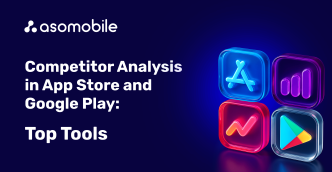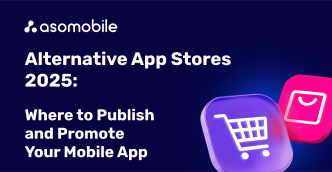App Store Ranking Factors in 2024
App stores use ranking factors to index apps, which are vital elements that ASO (App Store Optimization) specialists work with. What factors will we focus on when optimizing iOS apps in 2024?
Let's start with the basics—what does the App Store itself say in its developer guidelines?
App Store 2024 - Ranking Factors
The App Store's search optimization guide finds the latest tips and instructions to help our app find its place and users on this platform. The store emphasizes that search is the primary source of installs, and we can gather information on how to help users quickly find and install our app. Here are the key elements to focus on according to Apple's developer guide:
- Text Metadata:
Relevance and alignment of text metadata with the app’s category and features are crucial. Consistency between different fields is also vital to ensure that no field contradicts another but instead logically continues the message. Keywords are an essential part of this, which we’ll discuss later.
- Precise Keywords:
Filling out the keyword field correctly is essential. The focus is on the quality and characteristics of the keywords. According to the App Store, keywords should include terms users are likely to search for, describe features and capabilities, and cover broad and specific queries. It’s crucial to balance popular and less popular keywords. Avoid unauthorized use of trademarks, celebrity names, or other brand terms and phrases. Also, avoid using special symbols like # or @ unless they are part of your brand identity, as they don’t add extra value to search rankings.
- User Behavior:
This includes what users search for, find, and install based on search queries. User ratings and reviews are also included.
- Correct Categories:
The primary category of your app is significant and affects search results. It can also influence whether your app gets featured in collections or editorial recommendations. Don’t ignore choosing a secondary category - it can make search results more specific and help connect with your target users.
- App Events:
Events in games or apps, like competitions, premieres, broadcasts, or live streams, are also considered. Limited-time events have their cards that appear alongside the app in search results. The event card will display differently in the results depending on whether the app has already been installed.
- In-App Purchases and Promotions:
Since in-app purchases appear in search results, and clicking on them leads to the app’s page, they act as another factor influencing the user and potentially leading to a conversion.
ASO Optimization and Ranking Factors for iOS Apps
ASO efforts will focus on those metadata categories that are both considered by algorithms and influence users’ interactions. Users will interact with several key elements when searching for apps in the App Store. These include:
- Title: The app name that stands out and helps users understand what the app is about.
- App Icon: A visual symbol that serves as the first visual contact between the user and the app.
- Subtitle: A short description or slogan that explains the app’s primary purpose or features.
- App Rating: The number of stars and reviews that help users assess the app’s popularity and quality.
- Screenshots or Video Previews: Visual elements that showcase the app’s interface, functionality, and features.
- Promo Text: A short phrase that catches the user’s eye and can influence the decision to install the app.
- Developer: Information about the app’s creator, which can affect user trust.
- In-App Purchases: Indications of additional paid features or subscriptions within the app.
- Categories and Collections: Filters and curated lists help users find apps based on themes or interests.
- Editorial Articles and Recommendations: Suggested apps, usage tips, and themed collections from the App Store team.
These elements help users decide whether to download or purchase an app by providing essential information in a user-friendly and visually appealing way.
As for the algorithm, the most important ranking factors are:

- Title (30 characters): The app or game name. A common approach combines a brand keyword with a specific search term that helps the user understand the app’s purpose.
- Subtitle (30 characters): A continuation of the title, which can describe an app that features the game genre or directly addresses the user. Relevant keywords are a must here.
- Keywords: A field users don’t see, but it is crucial for the ranking algorithm. The challenge is to fill 100 characters with as many words as possible that cover the indexing of our semantic core.
These three metadata fields are the most important ranking factors in the App Store. But there’s more that can contribute to ranking:
- In-app events can also be a ranking factor, as the Event Title (30 characters) and a short description (50 characters) are indexed.
- In-app purchases: In-app purchases appear in search results and are part of our indexing strategy. The name of an in-app purchase is limited to 30 characters, and the description to 45 characters, so choose your words carefully.
Indirect Ranking Factors in the App Store
The term "indirect" should not mislead you into thinking these factors are less important. Although they can be harder to influence and adjust, they still play a significant role in the app’s search ranking.
- High Conversion Rates: The app store's and our goals align - apps need to be found and installed, with users making in-app purchases and subscribing. Conversion depends largely on visual elements, which complement and extend text optimization. To understand your app’s performance, you can use Store Benchmarks, which are average app metrics in the App Store for views-to-installs ratios.
- Good Ratings and Positive Reviews: These are crucial signals for the app store and users. A rating below four stars decreases conversion, and anything below three stars nearly eliminates installations. The App Store considers the app’s rating an indicator of quality, and a positive rating improves the app’s visibility in search results. The algorithm views user reviews as a measure of app quality and user satisfaction.
- User Retention Rates: User engagement and overall app performance significantly affect rankings. The App Store algorithm views retention rates as an app quality and value indicator. Apps that encourage active user interaction are considered more valuable. The longer users remain active and engaged with the app, the better its chances of ranking higher in the App Store. High engagement indicates that users find the app useful, enjoyable, and aligned with their needs, contributing to a higher ranking.
- App Quality and Performance: Regular updates that fix bugs, improve functionality, and add new content demonstrate our commitment to providing a better user experience. The App Store algorithm values apps that consistently improve over time. By quickly responding to user feedback and resolving issues, we can enhance the app’s performance and engagement, leading to a better ranking. Also, don’t forget to optimize the app’s performance to ensure faster load times and smooth user interaction.
- App Installation Speed: This refers not to the technical aspect but to the number of new users over a certain period. A high number of installs within a specific timeframe indicates strong user interest in the app, which can boost its search ranking.
- Localization and Global Reach: Targeting a global audience can significantly impact your app’s search ranking. Localizing the app makes it accessible to users across different languages, cultures, and regions, providing a personalized and culturally relevant experience that boosts user satisfaction and engagement.
A Few Conclusions
Optimizing apps in the App Store in 2024 requires attention to many factors influencing their ranking. The main factors include the effective use of text metadata, such as the title, subtitle, and keywords, which must be relevant and correctly placed. Behavioral aspects such as conversion rates, user reviews, and retention rates are also important, as the App Store algorithm views them as indicators of app quality and value.
Equally significant are indirect factors such as app quality and performance, regular updates, and installation speed, which reflect user interest. Localization and targeting the global market also play a crucial role, making the app accessible and appealing to a broad audience.
These elements help the app improve its position in the App Store’s search results and better meet users' needs, ultimately contributing to its success.
 Українська
Українська  Русский
Русский  Español
Español 






